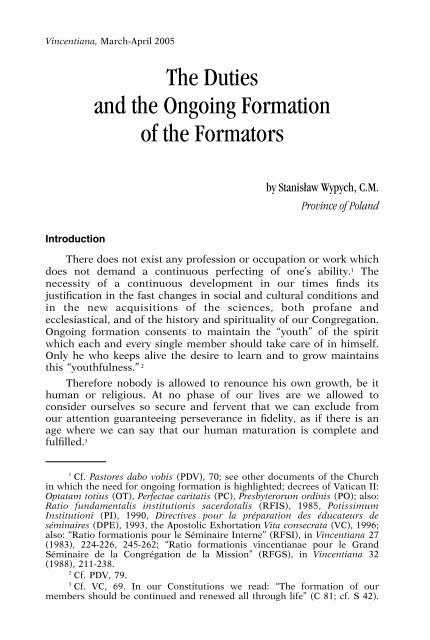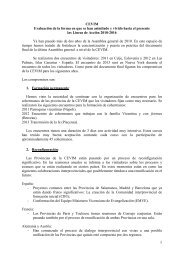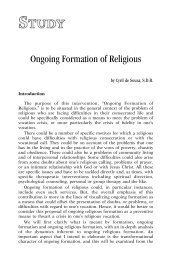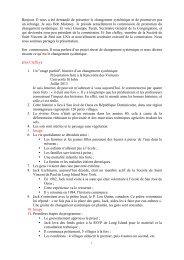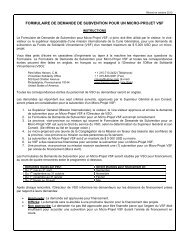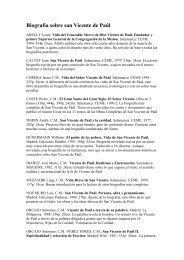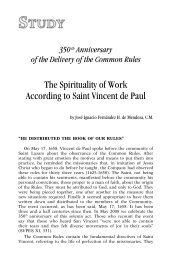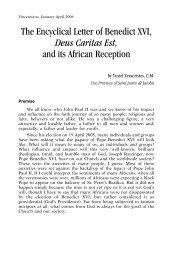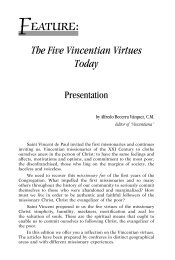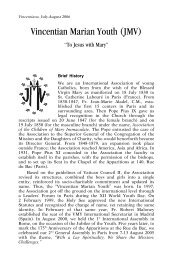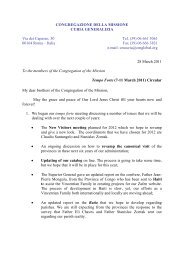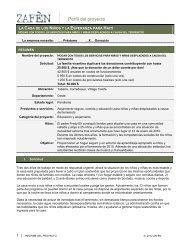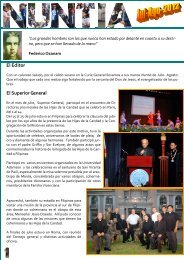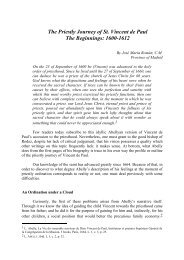The Duties and the Ongoing Formation of the Formators - CMGlobal
The Duties and the Ongoing Formation of the Formators - CMGlobal
The Duties and the Ongoing Formation of the Formators - CMGlobal
You also want an ePaper? Increase the reach of your titles
YUMPU automatically turns print PDFs into web optimized ePapers that Google loves.
VINCENTIANA 2-2005 - INGLESE<br />
December 20, 2005 − 2ª BOZZA<br />
Vincentiana, March-April 2005<br />
<strong>The</strong> <strong>Duties</strong><br />
<strong>and</strong> <strong>the</strong> <strong>Ongoing</strong> <strong>Formation</strong><br />
<strong>of</strong> <strong>the</strong> <strong>Formators</strong><br />
by Stanisław Wypych, C.M.<br />
Province <strong>of</strong> Pol<strong>and</strong><br />
Introduction<br />
<strong>The</strong>re does not exist any pr<strong>of</strong>ession or occupation or work which<br />
does not dem<strong>and</strong> a continuous perfecting <strong>of</strong> one’s ability. 1 <strong>The</strong><br />
necessity <strong>of</strong> a continuous development in our times finds its<br />
justification in <strong>the</strong> fast changes in social <strong>and</strong> cultural conditions <strong>and</strong><br />
in <strong>the</strong> new acquisitions <strong>of</strong> <strong>the</strong> sciences, both pr<strong>of</strong>ane <strong>and</strong><br />
ecclesiastical, <strong>and</strong> <strong>of</strong> <strong>the</strong> history <strong>and</strong> spirituality <strong>of</strong> our Congregation.<br />
<strong>Ongoing</strong> formation consents to maintain <strong>the</strong> “youth” <strong>of</strong> <strong>the</strong> spirit<br />
which each <strong>and</strong> every single member should take care <strong>of</strong> in himself.<br />
Only he who keeps alive <strong>the</strong> desire to learn <strong>and</strong> to grow maintains<br />
this “youthfulness.” 2<br />
<strong>The</strong>refore nobody is allowed to renounce his own growth, be it<br />
human or religious. At no phase <strong>of</strong> our lives are we allowed to<br />
consider ourselves so secure <strong>and</strong> fervent that we can exclude from<br />
our attention guaranteeing perseverance in fidelity, as if <strong>the</strong>re is an<br />
age where we can say that our human maturation is complete <strong>and</strong><br />
fulfilled. 3<br />
1<br />
Cf. Pastores dabo vobis (PDV), 70; see o<strong>the</strong>r documents <strong>of</strong> <strong>the</strong> Church<br />
in which <strong>the</strong> need for ongoing formation is highlighted; decrees <strong>of</strong> Vatican II:<br />
Optatam totius (OT), Perfectae caritatis (PC), Presbyterorum ordinis (PO); also:<br />
Ratio fundamentalis institutionis sacerdotalis (RFIS), 1985, Potissimum<br />
Institutioni (PI), 1990, Directives pour la préparation des éducateurs de<br />
séminaires (DPE), 1993, <strong>the</strong> Apostolic Exhortation Vita consecrata (VC), 1996;<br />
also: “Ratio formationis pour le Séminaire Interne” (RFSI), in Vincentiana 27<br />
(1983), 224-226, 245-262; “Ratio formationis vincentianae pour le Gr<strong>and</strong><br />
Séminaire de la Congrégation de la Mission” (RFGS), in Vincentiana 32<br />
(1988), 211-238.<br />
2<br />
Cf. PDV, 79.<br />
3<br />
Cf. VC, 69. In our Constitutions we read: “<strong>The</strong> formation <strong>of</strong> our<br />
members should be continued <strong>and</strong> renewed all through life” (C 81; cf. S 42).
VINCENTIANA 2-2005 - INGLESE<br />
December 20, 2005 − 2ª BOZZA<br />
156 S. Wypych<br />
<strong>The</strong> Christian matures in <strong>the</strong> aspiration toward <strong>the</strong> full knowledge<br />
<strong>of</strong> <strong>the</strong> Son <strong>of</strong> God, toward <strong>the</strong> state <strong>of</strong> <strong>the</strong> perfect human being,<br />
reaching to <strong>the</strong> very height <strong>of</strong> Christ’s full stature. 4 St. Paul admonishes<br />
Timothy: “Do not neglect <strong>the</strong> spiritual gift that is in you, which was<br />
given to you when <strong>the</strong> prophets spoke <strong>and</strong> <strong>the</strong> elders laid <strong>the</strong>ir h<strong>and</strong>s on<br />
you.... Keep on doing <strong>the</strong>se things, because if you do, you will save both<br />
yourself <strong>and</strong> those who hear you.” 5<br />
Since <strong>the</strong> future <strong>of</strong> <strong>the</strong> evangelization <strong>and</strong> <strong>the</strong> renewal <strong>of</strong><br />
community life depends on ongoing formation, it is necessary that<br />
<strong>the</strong> persons concerned are <strong>of</strong>fered <strong>the</strong> opportunity for continuous<br />
growth in fidelity to <strong>the</strong> charism <strong>and</strong> <strong>the</strong> mission <strong>of</strong> <strong>the</strong>ir own<br />
institute. 6 If <strong>the</strong> so-called indications are valid for all those who have<br />
answered <strong>the</strong> call <strong>of</strong> Christ, <strong>the</strong>n <strong>the</strong>se concern first <strong>of</strong> all <strong>the</strong><br />
formators <strong>and</strong> teachers. <strong>The</strong> educators <strong>and</strong> teachers must be aware<br />
that <strong>the</strong> formation <strong>of</strong> <strong>the</strong> students depends much on <strong>the</strong>ir way <strong>of</strong><br />
thinking <strong>and</strong> acting, 7 that this formation is tied to <strong>the</strong>ir mature <strong>and</strong><br />
strong personality as seen under <strong>the</strong> human <strong>and</strong> evangelical pr<strong>of</strong>ile 8<br />
<strong>and</strong>, in our case, also from <strong>the</strong> viewpoint <strong>of</strong> <strong>the</strong> charism <strong>of</strong> our<br />
Founder. <strong>The</strong> duties entrusted to <strong>the</strong> formators are indications <strong>of</strong> <strong>the</strong><br />
need <strong>of</strong> a continuous formation.<br />
1. <strong>The</strong> duties <strong>of</strong> <strong>the</strong> formators<br />
<strong>The</strong> growth <strong>of</strong> a particular person in maturity <strong>and</strong> sanctity <strong>of</strong> life<br />
requires a suitable atmosphere in <strong>the</strong> seminary <strong>and</strong> a determined<br />
attitude on <strong>the</strong> part <strong>of</strong> <strong>the</strong> persons involved in <strong>the</strong> formative process<br />
<strong>of</strong> <strong>the</strong> personality <strong>of</strong> <strong>the</strong> student <strong>and</strong> in <strong>the</strong> formation <strong>of</strong> his<br />
conscience. <strong>The</strong> community responsible for <strong>the</strong> formation consists <strong>of</strong><br />
<strong>the</strong> rector, director or spiritual director, superiors <strong>and</strong> teachers. In<br />
our Constitutions it is written: “Moderators <strong>and</strong> students should form<br />
a true educative community by being open to mutual underst<strong>and</strong>ing<br />
<strong>and</strong> trust <strong>and</strong> by maintaining a constant <strong>and</strong> active contact with each<br />
o<strong>the</strong>r.” 9 Under <strong>the</strong> guidance <strong>of</strong> <strong>the</strong> director <strong>the</strong>y form a strict unity <strong>of</strong><br />
spirit <strong>and</strong> action; among <strong>the</strong>m <strong>and</strong> <strong>the</strong> students <strong>the</strong>y form a kind <strong>of</strong><br />
family bond which nourishes in <strong>the</strong> students <strong>the</strong> joy <strong>of</strong> <strong>the</strong>ir own<br />
vocation. 10 <strong>The</strong> unity <strong>of</strong> <strong>the</strong> educators not only helps <strong>the</strong> educational<br />
program to be put into practice properly, but also <strong>and</strong> above all it<br />
4<br />
Ephesians 4:13.<br />
5<br />
1 Timothy 4:14-16.<br />
6<br />
Cf. VC, 65.<br />
7<br />
Cf. OT, 5.<br />
8<br />
Cf. PDV, 66.<br />
9<br />
C 95, § 1.<br />
10<br />
Cf. OT, 5.
VINCENTIANA 2-2005 - INGLESE<br />
December 20, 2005 − 2ª BOZZA<br />
<strong>The</strong> <strong>Duties</strong> <strong>and</strong> <strong>the</strong> <strong>Ongoing</strong> <strong>Formation</strong> <strong>of</strong> <strong>the</strong> <strong>Formators</strong><br />
157<br />
<strong>of</strong>fers c<strong>and</strong>idates for <strong>the</strong> priesthood a significant example <strong>and</strong> a<br />
practical introduction to that ecclesial communion which is a<br />
fundamental value <strong>of</strong> Christian living <strong>and</strong> <strong>of</strong> <strong>the</strong> pastoral ministry. 11<br />
This indication regarding priestly formation is also valid <strong>and</strong><br />
assumes a particular value for <strong>the</strong> formative process <strong>of</strong> <strong>the</strong> students<br />
<strong>of</strong> <strong>the</strong> Congregation. In <strong>the</strong> community <strong>the</strong>y experience Vincentian<br />
life. 12 Since <strong>the</strong> charism is not transmitted <strong>the</strong>oretically, but ra<strong>the</strong>r<br />
will be sought after, discovered <strong>and</strong> lived within <strong>the</strong> community,<br />
that community becomes its epiphany. <strong>The</strong> educators united around<br />
<strong>the</strong> director must aspire towards <strong>the</strong> same goal, especially if it is a<br />
matter <strong>of</strong> establishing an educational program <strong>and</strong> <strong>of</strong> maintaining<br />
<strong>the</strong> harmony <strong>of</strong> its realization. <strong>The</strong> director, however, is not <strong>the</strong> only<br />
one responsible for <strong>the</strong> success <strong>of</strong> formation, but <strong>the</strong> whole<br />
formation team. 13<br />
<strong>The</strong> formator is for <strong>the</strong> c<strong>and</strong>idate to community <strong>the</strong> representative<br />
<strong>of</strong> <strong>the</strong> Church <strong>and</strong> <strong>of</strong> <strong>the</strong> Congregation; he represents visibly<br />
Christ <strong>the</strong> evangelizer <strong>of</strong> <strong>the</strong> poor. Christ calls those he wants to<br />
follow him in conformity with <strong>the</strong> charism <strong>of</strong> <strong>the</strong> Founder <strong>and</strong><br />
indicates concrete persons for <strong>the</strong> formation <strong>of</strong> his followers. <strong>The</strong><br />
formator’s love for <strong>the</strong> Church <strong>and</strong> for <strong>the</strong> Congregation should have<br />
a very high degree <strong>of</strong> zeal <strong>and</strong> pr<strong>of</strong>undity in order to be able to share<br />
it also with <strong>the</strong> students. Being a representative <strong>of</strong> <strong>the</strong> Church <strong>and</strong> <strong>of</strong><br />
<strong>the</strong> Congregation, <strong>the</strong> educator presents himself to <strong>the</strong> c<strong>and</strong>idate as a<br />
fa<strong>the</strong>r <strong>and</strong> a friend. He is fa<strong>the</strong>r because <strong>of</strong> his prestige, experience<br />
<strong>and</strong> care for <strong>the</strong> integral formation <strong>of</strong> <strong>the</strong> young men; he is friend<br />
because <strong>of</strong> his intimacy, benevolence <strong>and</strong> constant availability. As<br />
fa<strong>the</strong>r, he gives advice, dem<strong>and</strong>s <strong>and</strong> forgives. In <strong>the</strong> role <strong>of</strong> friend he<br />
accompanies <strong>the</strong> student, works toge<strong>the</strong>r with him <strong>and</strong> helps him in<br />
<strong>the</strong> process <strong>of</strong> self-formation. In <strong>the</strong> student’s life <strong>the</strong> role <strong>of</strong> master<br />
<strong>and</strong> guide develops too. It is obvious that Christ, <strong>the</strong> evangelizer <strong>of</strong><br />
<strong>the</strong> poor <strong>and</strong> <strong>the</strong> Rule <strong>of</strong> <strong>the</strong> Congregation, 14 is <strong>the</strong> sole master. <strong>The</strong><br />
principal task <strong>of</strong> <strong>the</strong> formator consists in accompanying <strong>the</strong> student<br />
to meet Christ for a dialogue with him about his life, his vocation<br />
<strong>and</strong> <strong>the</strong> quality <strong>of</strong> his mission. <strong>The</strong> spiritual aid given to <strong>the</strong> student<br />
during his formation is expressed mostly through prayer, spiritual<br />
sacrifices <strong>and</strong> personal witnessing <strong>of</strong> life. A pr<strong>of</strong>ound knowledge <strong>of</strong><br />
each student, <strong>of</strong> his character, his ability, his attachment <strong>and</strong> his<br />
behavior in various situations, is <strong>the</strong> important task <strong>of</strong> <strong>the</strong> formators.<br />
It is necessary to know <strong>the</strong> student continuously <strong>and</strong> personally<br />
11<br />
Cf. PDV, 66.<br />
12<br />
Cf. C 79.<br />
13<br />
Cf. B. TENBAILLEAU, « L’éducateur “interprète” du projet éducatif, » in<br />
Seminarium 34 (1994), n. 2, pp. 296-298; RFGS, 53.<br />
14<br />
Cf. SV XII, 130.
VINCENTIANA 2-2005 - INGLESE<br />
December 20, 2005 − 2ª BOZZA<br />
158 S. Wypych<br />
through discussions <strong>and</strong> an attentive observation <strong>of</strong> his conduct in<br />
<strong>the</strong> concrete situations <strong>of</strong> everyday life. It is also necessary to know<br />
<strong>the</strong> environment from which <strong>the</strong> c<strong>and</strong>idate comes. <strong>The</strong> formators’<br />
common activities must make <strong>the</strong> student’s education process<br />
become an ever more pr<strong>of</strong>ound self-formation. 15 It must be noted that<br />
self-formation is based on three rules: knowing oneself, accepting<br />
oneself <strong>and</strong> transcending oneself. <strong>The</strong> student will be helped in this<br />
process, but at <strong>the</strong> same time it is necessary to awaken his conviction<br />
that self-formation does not mean having <strong>the</strong> monopoly to direct<br />
himself. <strong>The</strong> c<strong>and</strong>idate for <strong>the</strong> Congregation confirms his liberty in<br />
<strong>the</strong> best way when he permits <strong>the</strong> Holy Spirit to form him, as well as<br />
when he accepts willingly <strong>the</strong> mediators <strong>of</strong> whom <strong>the</strong> Spirit makes<br />
use. <strong>The</strong> efforts <strong>of</strong> <strong>the</strong> formators are really <strong>and</strong> fully effective only<br />
when <strong>the</strong> c<strong>and</strong>idate collaborates with <strong>the</strong>m sincerely <strong>and</strong> with<br />
conviction. 16 Undoubtedly it is very important that, when educators<br />
fulfill <strong>the</strong>ir duties, <strong>the</strong>re be mutual confidence between formators <strong>and</strong><br />
students. A good guide knows how to foresee <strong>the</strong> obstacles, warn<br />
about <strong>the</strong>m <strong>and</strong> remove <strong>the</strong>m as far as possible. In his attitude he<br />
must keep in mind <strong>the</strong> rule: suaviter in forma, fortiter in re. Even <strong>the</strong><br />
toughest dem<strong>and</strong>s will be realized if made with tact.<br />
It would be useful to consider <strong>the</strong> duties <strong>of</strong> <strong>the</strong> particular<br />
formators. <strong>The</strong> rector/director is responsible for <strong>the</strong> direction <strong>of</strong> <strong>the</strong><br />
community <strong>and</strong> also for <strong>the</strong> global formation <strong>of</strong> <strong>the</strong> students, for <strong>the</strong><br />
conditions most suited for formation, for collaboration with <strong>the</strong><br />
moderators, for relations with <strong>the</strong> educators <strong>and</strong> with <strong>the</strong> employees<br />
<strong>of</strong> <strong>the</strong> seminary, with <strong>the</strong> students <strong>and</strong> o<strong>the</strong>r persons who participate<br />
in <strong>the</strong> process <strong>of</strong> formation. Within <strong>the</strong> circle <strong>of</strong> educators <strong>the</strong><br />
director is considered as <strong>the</strong> “sign <strong>of</strong> unity” (signum unitatis); he<br />
takes care that, under his direction <strong>the</strong> teachers <strong>and</strong> moderators,<br />
united in a community <strong>of</strong> spirit <strong>and</strong> action, are able to construct<br />
toge<strong>the</strong>r with <strong>the</strong> students a friendly relationship. Even if some <strong>of</strong><br />
<strong>the</strong>se duties can be entrusted to collaborators, it is <strong>the</strong> director who<br />
supervises <strong>the</strong>ir realization. <strong>The</strong> director takes care that <strong>the</strong> students’<br />
formation conforms to <strong>the</strong> rules defined by <strong>the</strong> Church <strong>and</strong> to <strong>the</strong><br />
directives approved by <strong>the</strong> Congregation. He is also responsible to his<br />
superiors for making an overall evaluation <strong>of</strong> <strong>the</strong> c<strong>and</strong>idates’<br />
dispositions at <strong>the</strong> time <strong>of</strong> <strong>the</strong>ir admission into <strong>the</strong> seminary, as well<br />
as during <strong>the</strong> different phases <strong>of</strong> <strong>the</strong>ir education: before making vows<br />
<strong>and</strong> before priestly ordination. In our Ratio formationis 17 we read:<br />
<strong>The</strong> director has <strong>the</strong> main task in <strong>the</strong> formation community, in order to<br />
15<br />
Cf. PDV, 69.<br />
16<br />
Ibid.<br />
17<br />
RFSI, IV, 2.
VINCENTIANA 2-2005 - INGLESE<br />
December 20, 2005 − 2ª BOZZA<br />
<strong>The</strong> <strong>Duties</strong> <strong>and</strong> <strong>the</strong> <strong>Ongoing</strong> <strong>Formation</strong> <strong>of</strong> <strong>the</strong> <strong>Formators</strong><br />
159<br />
animate <strong>and</strong> to coordinate <strong>the</strong> activity <strong>and</strong> <strong>the</strong> objectives, as a<br />
guarantee <strong>of</strong> <strong>the</strong> fulfillment <strong>of</strong> <strong>the</strong> Internal Seminary’s end.<br />
<strong>The</strong> director fulfills particularly delicate tasks regarding <strong>the</strong><br />
students. In conformity with each c<strong>and</strong>idate’s age <strong>and</strong> development<br />
he examines accurately <strong>the</strong> righteousness <strong>of</strong> his intentions, his<br />
freedom <strong>of</strong> choice, his spiritual, moral <strong>and</strong> intellectual suitability,<br />
physical condition <strong>and</strong> psychological aptness, but also his<br />
preparation to endure a hard life <strong>and</strong> to exercise activities <strong>of</strong> <strong>the</strong><br />
Congregation. In <strong>the</strong> sphere <strong>of</strong> <strong>the</strong> director’s duties is included also<br />
collaboration with <strong>the</strong> communities which have an impact on <strong>the</strong><br />
perseverance <strong>and</strong> development <strong>of</strong> <strong>the</strong> c<strong>and</strong>idate’s vocation. In<br />
particular this is about his family, his parish <strong>of</strong> origin <strong>and</strong> also <strong>the</strong><br />
associations <strong>and</strong> youth movements where <strong>the</strong> student received his<br />
fundamental Christian formation <strong>and</strong> with which he remains in<br />
contact.<br />
It is written in our Statutes that: “In houses <strong>of</strong> formation, care<br />
should be given to provide suitable confreres who will function as<br />
confessors <strong>and</strong> spiritual directors, as <strong>the</strong> need dem<strong>and</strong>s.” 18 In <strong>the</strong> area<br />
<strong>of</strong> <strong>the</strong> spiritual director’s service it is necessary to distinguish two<br />
levels: <strong>the</strong> communitarian <strong>and</strong> <strong>the</strong> individual. His activity with regard<br />
to <strong>the</strong> community is expressed in taking care <strong>of</strong> <strong>the</strong> animation<br />
relative to <strong>the</strong> spirituality <strong>of</strong> all students by means <strong>of</strong> retreats <strong>and</strong><br />
days <strong>of</strong> recollection, <strong>of</strong> conferences on <strong>the</strong> spiritual life, <strong>and</strong> <strong>of</strong> <strong>the</strong><br />
liturgy <strong>and</strong> prayer in common. On <strong>the</strong> individual level <strong>the</strong> spiritual<br />
director fulfills his duties with regard to certain students, who choose<br />
him as spiritual director during <strong>the</strong> formation <strong>of</strong> <strong>the</strong>ir conscience,<br />
<strong>the</strong> discernment <strong>of</strong> <strong>the</strong>ir vocation <strong>and</strong> <strong>the</strong> development <strong>of</strong> <strong>the</strong>ir<br />
spiritual life.<br />
<strong>The</strong> confessors take part in <strong>the</strong> formation <strong>of</strong> <strong>the</strong> interior life <strong>of</strong><br />
<strong>the</strong> students. <strong>The</strong>y must be easily accessible <strong>and</strong> must come regularly<br />
to <strong>the</strong> seminary at <strong>the</strong> times fixed to serve <strong>the</strong> students in <strong>the</strong><br />
Sacrament <strong>of</strong> Reconciliation. <strong>The</strong> tasks <strong>of</strong> <strong>the</strong> confessors regard <strong>the</strong><br />
sacramental dimension.<br />
In conformity with <strong>the</strong> directives <strong>of</strong> <strong>the</strong> Church, <strong>the</strong> teachers<br />
must consider <strong>the</strong>mselves as real <strong>and</strong> proper educators: “Experience<br />
teaches that <strong>the</strong>y <strong>of</strong>ten have a greater influence on <strong>the</strong> development <strong>of</strong><br />
<strong>the</strong> priest’s personality than o<strong>the</strong>r educators.” 19 It is not sufficient to<br />
have an academic degree in <strong>the</strong> chosen subject, but a spiritual,<br />
didactical, pedagogical formation is necessary <strong>and</strong> a sense <strong>of</strong> integral<br />
formation. <strong>The</strong> teacher educates with his own character, with what<br />
he teaches <strong>and</strong> in <strong>the</strong> way he teaches. A <strong>the</strong>ologian, although he uses<br />
18<br />
S 50.<br />
19<br />
Cf. PDV, 67.
VINCENTIANA 2-2005 - INGLESE<br />
December 20, 2005 − 2ª BOZZA<br />
160 S. Wypych<br />
<strong>the</strong> scientific preparation <strong>of</strong> his subject, realizes his task on behalf <strong>of</strong><br />
<strong>the</strong> Church, <strong>of</strong> <strong>the</strong> Congregation <strong>and</strong> he takes part toge<strong>the</strong>r with <strong>the</strong><br />
moderators in formation. He must avoid a subjective <strong>and</strong> individual<br />
st<strong>and</strong>point. It is up to <strong>the</strong> teachers to work toge<strong>the</strong>r in harmony with<br />
o<strong>the</strong>r formators, in order to secure an adequate level <strong>of</strong> teaching <strong>and</strong><br />
to improve <strong>the</strong>ir own qualifications <strong>and</strong> pr<strong>of</strong>essional ability. 20<br />
2. <strong>The</strong> personality <strong>of</strong> <strong>the</strong> formator<br />
Nobody is born as a formator, but he must have suitable<br />
dispositions. It is obvious that <strong>the</strong> effect <strong>of</strong> <strong>the</strong> formation depends to<br />
a large extent on <strong>the</strong> accurate choice <strong>of</strong> educators. St. Vincent was<br />
convinced that <strong>the</strong> formation <strong>of</strong> priests is an ars artium, regimen<br />
animarum (St. Gregory <strong>the</strong> Great) <strong>and</strong> that this task is <strong>the</strong> most<br />
noble. <strong>The</strong> most difficult part is to choose for this work <strong>the</strong> best <strong>and</strong><br />
well prepared confreres. 21 Confreres are chosen for this service who<br />
are distinguished for a certain experience <strong>of</strong> life, human maturity,<br />
balanced spirit, ability to listen <strong>and</strong> dialogue, positive opinion, but at<br />
<strong>the</strong> same time critical <strong>of</strong> modern culture, secure in <strong>the</strong>ir own<br />
vocation, with knowledge <strong>and</strong> love <strong>of</strong> <strong>the</strong> charism. 22 <strong>The</strong> formator<br />
must first <strong>of</strong> all be a man <strong>of</strong> prayer, with a strong supernatural sense,<br />
a pr<strong>of</strong>ound spiritual life, exemplary behavior <strong>and</strong> suitable <strong>and</strong> varied<br />
experience in pastoral work. 23<br />
<strong>The</strong> formator is characterized by an adequate critical distance<br />
with regard to himself; he is willing to recognize <strong>and</strong> correct <strong>the</strong><br />
dem<strong>and</strong>s he makes on himself <strong>and</strong> o<strong>the</strong>rs, taking into account fatigue<br />
<strong>and</strong> human limitations. A mature educator does not draw o<strong>the</strong>rs to<br />
his own person.<br />
3. <strong>The</strong> preparation <strong>of</strong> formators<br />
It is very important not only to choose <strong>the</strong> right formators but<br />
also to prepare <strong>the</strong>m <strong>and</strong> help <strong>the</strong>m toward a constant development<br />
<strong>of</strong> <strong>the</strong>ir pr<strong>of</strong>essional capability in such a way that <strong>the</strong>y may better<br />
20<br />
Cf. F. LAMBIASI, « Il pr<strong>of</strong>essore come educatore e testimone della fede, »<br />
in Seminariun 34 (1994), n. 2, pp. 319-326.<br />
21<br />
<strong>The</strong> happiness <strong>of</strong> Christianity depends on priests.... Oh, how we must try<br />
to make <strong>the</strong>m all good, because that is our job, <strong>and</strong> priesthood is something very<br />
held up!... O my Savior! how much <strong>the</strong> poor missionaries must give <strong>the</strong>mselves<br />
to you in order to contribute to forming good ecclesiastics, because it is <strong>the</strong> most<br />
difficult work, <strong>the</strong> highest, <strong>the</strong> more important for <strong>the</strong> salvation <strong>of</strong> souls <strong>and</strong> for<br />
<strong>the</strong> advent <strong>of</strong> Christianity! (SV XI, 7-8).<br />
22<br />
Cf. P. LAGHI, « Direttive sulla preparazione degli educatori nei<br />
seminari, » in Seminarium 34 (1994), n. 2, pp. 221-257.<br />
23<br />
Cf. O posłudze w życiu kapłana, Rzym 1994, 90.
VINCENTIANA 2-2005 - INGLESE<br />
December 20, 2005 − 2ª BOZZA<br />
<strong>The</strong> <strong>Duties</strong> <strong>and</strong> <strong>the</strong> <strong>Ongoing</strong> <strong>Formation</strong> <strong>of</strong> <strong>the</strong> <strong>Formators</strong><br />
161<br />
fulfill <strong>the</strong> work entrusted to <strong>the</strong>m. “<strong>The</strong> task <strong>of</strong> formation <strong>of</strong><br />
c<strong>and</strong>idates for <strong>the</strong> priesthood requires not only a certain special<br />
preparation <strong>of</strong> those to whom this work is entrusted, one that is<br />
pr<strong>of</strong>essional, pedagogical, spiritual, human <strong>and</strong> <strong>the</strong>ological, but also a<br />
spirit <strong>of</strong> communion <strong>and</strong> <strong>of</strong> cooperating toge<strong>the</strong>r to carry out <strong>the</strong><br />
program, so that <strong>the</strong> unity <strong>of</strong> <strong>the</strong> pastoral action <strong>of</strong> <strong>the</strong> seminary is<br />
always maintained under <strong>the</strong> leadership <strong>of</strong> <strong>the</strong> rector.” 24 Already in <strong>the</strong><br />
decree Optatam totius it is written that <strong>the</strong> educators <strong>of</strong> <strong>the</strong> seminary<br />
must be carefully prepared in sound doctrine, suitable pastoral<br />
experience <strong>and</strong> special spiritual <strong>and</strong> pedagogical training. 25 In <strong>the</strong> Code<br />
<strong>of</strong> Canon Law we find <strong>the</strong> advice to continue for our entire life<br />
spiritual, doctrinal, <strong>and</strong> practical formation. 26 In our Constitutions we<br />
read: “Since <strong>the</strong> formation <strong>of</strong> students depends primarily on suitable<br />
educators, moderators <strong>and</strong> teachers should be prepared with solid<br />
doctrine, suitable pastoral experience, <strong>and</strong> special training.” 27<br />
In <strong>the</strong> exhortation Pastores dabo vobis <strong>the</strong> suitable preparation <strong>of</strong><br />
formators is mentioned in first place, a preparation <strong>of</strong> a pr<strong>of</strong>essional,<br />
pedagogical, spiritual, human <strong>and</strong> <strong>the</strong>ological type, but also <strong>the</strong> need<br />
to protect <strong>the</strong> spirit <strong>of</strong> community, collaboration <strong>and</strong> agreement in<br />
carrying out <strong>the</strong> program. 28 <strong>The</strong> preparation regards an introductory<br />
period, if possible, before taking on <strong>the</strong> functions <strong>and</strong> also ongoing<br />
formation. 29<br />
4. <strong>The</strong> aspects <strong>of</strong> ongoing formation<br />
<strong>Ongoing</strong> formation consists in continuing <strong>the</strong> integral process <strong>of</strong><br />
ongoing maturation, in deepening each dimension <strong>of</strong> formation. We<br />
deal here with <strong>the</strong> goal itself, <strong>the</strong> aspects <strong>and</strong> <strong>the</strong> means: human,<br />
spiritual, intellectual, pastoral, communitarian <strong>and</strong> Vincentian. 30 <strong>The</strong><br />
knowledge <strong>of</strong> <strong>the</strong> world <strong>of</strong> young people is very important. 31<br />
Deepening <strong>of</strong> formation must first deal with its human dimension,<br />
which constitutes necessarily <strong>the</strong> foundation. 32 In this sphere <strong>the</strong>re<br />
are characteristics which are particularly important like interior<br />
freedom, affective maturity, ability to keep in contact with people,<br />
24<br />
Cf. PDV, 66.<br />
25<br />
Cf. DPE, 2.<br />
26<br />
Canon 661.<br />
27<br />
C 94. In our Ratio formationis we read: “<strong>The</strong> role <strong>of</strong> <strong>the</strong> Director <strong>and</strong> <strong>of</strong><br />
<strong>the</strong> <strong>Formators</strong> dem<strong>and</strong>s preparation. <strong>The</strong> Visitor must see to it that <strong>the</strong><br />
confreres are prepared for this function” (RFSI, V, 2).<br />
28<br />
Cf. PDV, 66.<br />
29<br />
Cf. P. LAGHI, op. cit.<br />
30<br />
Cf. PC, 18.<br />
31<br />
LAGHI, op. cit., pp. 251-257.<br />
32<br />
Cf. PDV, 43.
VINCENTIANA 2-2005 - INGLESE<br />
December 20, 2005 − 2ª BOZZA<br />
162 S. Wypych<br />
serenity, sensitivity to <strong>the</strong> suffering <strong>of</strong> o<strong>the</strong>rs, love for truth <strong>and</strong><br />
uniformity between words <strong>and</strong> actions. Active pedagogy <strong>and</strong> <strong>the</strong><br />
perfecting <strong>of</strong> knowing how to work in groups are necessary.<br />
In spiritual formation we deal with living faith in a pr<strong>of</strong>ound<br />
way. <strong>The</strong> purpose <strong>of</strong> <strong>the</strong> Congregation 33 orients <strong>and</strong> unites our<br />
formation: “This purpose is achieved when, faithful to St. Vincent,<br />
<strong>the</strong> members... make every effort to put on <strong>the</strong> spirit <strong>of</strong> Christ himself<br />
(CR I, 3), 34 in order to acquire a holiness appropriate to <strong>the</strong>ir vocation<br />
(CR XII, 13). 35 This means uniting oneself with God, seeking Christ in<br />
faithful meditation on <strong>the</strong> Word <strong>of</strong> God, in <strong>the</strong> Eucharist, in prayer,<br />
in <strong>the</strong> poor <strong>and</strong> in <strong>the</strong> sick, in <strong>the</strong> needy from both a material <strong>and</strong><br />
moral point <strong>of</strong> view. 36<br />
<strong>The</strong> third aspect consists <strong>of</strong> intellectual formation. This<br />
regards, among o<strong>the</strong>rs, <strong>the</strong> analysis <strong>of</strong> <strong>the</strong> documents <strong>of</strong> <strong>the</strong> Church,<br />
in particular those on social <strong>and</strong> religious conditions, 37 on <strong>the</strong><br />
exhortation to organize works <strong>of</strong> mercy, on <strong>the</strong> reasons for poverty,<br />
but also documents which give answers to <strong>the</strong> new forms <strong>of</strong> poverty.<br />
It is necessary to keep oneself updated with regard to important<br />
new publications in <strong>the</strong> biblical field, <strong>the</strong>ology, pastoral studies,<br />
pedagogy <strong>and</strong> Vincentian studies. In <strong>the</strong> latter case it is necessary to<br />
study <strong>the</strong> Rules, <strong>the</strong> Constitutions, <strong>the</strong> Statutes, documents <strong>of</strong> <strong>the</strong><br />
Congregation <strong>and</strong> <strong>of</strong> <strong>the</strong> Vincentian Family.<br />
It is also necessary to deepen pastoral experience within <strong>the</strong><br />
social reality, which is undergoing rapid change, <strong>of</strong> <strong>the</strong> Church <strong>and</strong><br />
<strong>the</strong> Congregation. Here too, <strong>the</strong> purpose <strong>of</strong> <strong>the</strong> Congregation orients<br />
our formation: <strong>the</strong>y “work at evangelizing <strong>the</strong> poor, especially <strong>the</strong> more<br />
ab<strong>and</strong>oned; help <strong>the</strong> clergy <strong>and</strong> laity in <strong>the</strong>ir formation <strong>and</strong> lead <strong>the</strong>m to<br />
a fuller participation in <strong>the</strong> evangelizing <strong>of</strong> <strong>the</strong> poor.” 38 Here is treated<br />
direct contact with <strong>the</strong> poor, letting oneself be evangelized by <strong>the</strong>m,<br />
getting to know <strong>the</strong> works <strong>of</strong> <strong>the</strong> Vincentian Family, studying <strong>the</strong><br />
causes <strong>of</strong> poverty <strong>and</strong>, toge<strong>the</strong>r with international organizations,<br />
seeking means to find solutions.<br />
<strong>Formation</strong> to community. <strong>The</strong> dynamics <strong>of</strong> community life<br />
constitute a fur<strong>the</strong>r field <strong>of</strong> formation. In <strong>the</strong> decree Perfectae<br />
Caritatis we read: “Common life, fashioned on <strong>the</strong> model <strong>of</strong> <strong>the</strong> early<br />
Church..., <strong>and</strong> given new force by <strong>the</strong> teaching <strong>of</strong> <strong>the</strong> Gospel, <strong>the</strong> sacred<br />
liturgy <strong>and</strong> especially <strong>the</strong> Eucharist, should continue to be lived in<br />
33<br />
Cf.C1.<br />
34<br />
St. Vincent says: “It is necessary <strong>the</strong>n, Fa<strong>the</strong>r, that you empty yourself<br />
in order to put on Jesus Christ” (SV XI, 343).<br />
35<br />
Cf. C 1, 1º.<br />
36<br />
Cf. PDV, 45.<br />
37<br />
Ibid.<br />
38<br />
C 1, 2º <strong>and</strong> 3º.
VINCENTIANA 2-2005 - INGLESE<br />
December 20, 2005 − 2ª BOZZA<br />
<strong>The</strong> <strong>Duties</strong> <strong>and</strong> <strong>the</strong> <strong>Ongoing</strong> <strong>Formation</strong> <strong>of</strong> <strong>the</strong> <strong>Formators</strong><br />
163<br />
prayer <strong>and</strong> <strong>the</strong> communion <strong>of</strong> <strong>the</strong> same spirit.” 39 We are not surprised,<br />
<strong>the</strong>refore, that <strong>the</strong> Church wishes that <strong>the</strong> persons who live in<br />
community be true experts <strong>of</strong> communion <strong>and</strong> [to] practise <strong>the</strong><br />
spirituality <strong>of</strong> communion as “witnesses <strong>and</strong> architects <strong>of</strong> <strong>the</strong> plan for<br />
unity which is <strong>the</strong> crowning point <strong>of</strong> human history in God’s design.” 40<br />
<strong>The</strong> people <strong>of</strong> God desire fraternal community to be <strong>the</strong> sign <strong>and</strong><br />
testimony <strong>of</strong> <strong>the</strong> community <strong>of</strong> goods <strong>and</strong> fraternal feelings, <strong>of</strong> <strong>the</strong><br />
community <strong>of</strong> prayer <strong>and</strong> common mission. 41 And so, formators must<br />
continuously <strong>and</strong> tirelessly carry out <strong>the</strong> divine-human work <strong>of</strong><br />
constructing <strong>the</strong> fraternal community; because this allows one to<br />
acquire <strong>the</strong> experience <strong>of</strong> life <strong>and</strong> <strong>of</strong> joy in living toge<strong>the</strong>r. <strong>The</strong><br />
community is built up on <strong>the</strong> base <strong>of</strong> prayer in common, liturgy <strong>and</strong>,<br />
above all, <strong>the</strong> Eucharist. It is also necessary to emphasize <strong>the</strong> need to<br />
develop useful characteristics in all human relations like good<br />
education, gentleness, sincerity, calmness, delicateness <strong>and</strong> <strong>the</strong><br />
capability <strong>of</strong> putting all in common. <strong>The</strong> formator must know how to<br />
celebrate toge<strong>the</strong>r with o<strong>the</strong>r persons, find time for recreation<br />
toge<strong>the</strong>r; he must protect his own serenity, peace <strong>and</strong> joy.<br />
A very important aspect is Vincentian formation. <strong>The</strong><br />
relationship with <strong>the</strong> Founder <strong>and</strong> with <strong>the</strong> charism transmitted by<br />
him, deepened <strong>and</strong> developed from generation to generation,<br />
constitutes a fundamental factor. <strong>The</strong> charism <strong>of</strong> <strong>the</strong> Founder<br />
signifies an “experience <strong>of</strong> <strong>the</strong> Spirit,” transmitted to [his] disciples to<br />
be lived, safeguarded, deepened <strong>and</strong> constantly developed by <strong>the</strong>m, in<br />
harmony with <strong>the</strong> Body <strong>of</strong> Christ continually in <strong>the</strong> process <strong>of</strong> growth. 42<br />
<strong>The</strong> director <strong>of</strong> formation has <strong>the</strong> obligation not only to know <strong>and</strong><br />
respect healthy traditions, spirituality, <strong>the</strong> charism <strong>and</strong> mission <strong>of</strong><br />
<strong>the</strong> Congregation, but also to provide that, in <strong>the</strong> programs <strong>of</strong><br />
formation, study <strong>and</strong> prayerful reflection, <strong>the</strong> person <strong>of</strong> <strong>the</strong> Founder<br />
<strong>and</strong> his charism find a place. <strong>The</strong> identity understood in such a way<br />
allows one to proceed with various creative activities, which can<br />
respond to <strong>the</strong> signs <strong>of</strong> <strong>the</strong> times emerging in today’s world <strong>and</strong> make<br />
<strong>the</strong> charism more alive <strong>and</strong> up-to-date. 43<br />
A dominating element <strong>of</strong> <strong>the</strong> charism is formed by a pr<strong>of</strong>ound<br />
eagerness <strong>of</strong> <strong>the</strong> soul to configure itself to Christ <strong>the</strong> evangelizer <strong>of</strong><br />
<strong>the</strong> poor, <strong>the</strong> Rule <strong>of</strong> <strong>the</strong> Congregation, <strong>the</strong> healthy traditions <strong>of</strong> <strong>the</strong><br />
Congregation, <strong>the</strong> spirit <strong>of</strong> <strong>the</strong> Rule, <strong>of</strong> <strong>the</strong> Constitutions <strong>and</strong> <strong>of</strong> <strong>the</strong><br />
Statutes. 44<br />
39<br />
PC, 15.<br />
40<br />
Cf. VC, 46.<br />
41<br />
Cf. VC, 47.<br />
42<br />
Mutuae Relationes, 11.<br />
43<br />
Cf. VC, 37.<br />
44<br />
Cf. VC, 36.
VINCENTIANA 2-2005 - INGLESE<br />
December 20, 2005 − 2ª BOZZA<br />
164 S. Wypych<br />
5. <strong>The</strong> modality <strong>of</strong> <strong>the</strong> ongoing formation <strong>of</strong> formators<br />
<strong>The</strong> task <strong>of</strong> <strong>the</strong> formation <strong>of</strong> our confreres cannot be realized<br />
without union with <strong>the</strong> universal <strong>and</strong> local Church. <strong>The</strong> need exists<br />
to create apt structures <strong>of</strong> ongoing formation <strong>of</strong> <strong>the</strong> educators <strong>and</strong> to<br />
exercise a certain alertness. 45 Within <strong>the</strong> sphere <strong>of</strong> <strong>the</strong> obligations <strong>of</strong><br />
bishops <strong>and</strong> superiors is included <strong>the</strong> creation <strong>of</strong> projects <strong>and</strong><br />
possibilities for ongoing formation. <strong>The</strong>y are <strong>the</strong> ones who have to<br />
organize short or long periods to favor this. This obligation, however,<br />
is put above all on <strong>the</strong> shoulders <strong>of</strong> each educator. <strong>The</strong> formation<br />
must last for <strong>the</strong> whole life 46 <strong>and</strong> each moment (we may say) is a<br />
favorable moment.<br />
It is important to define <strong>the</strong> plan <strong>of</strong> ongoing formation which<br />
regards <strong>the</strong> whole life. On <strong>the</strong> institutional level this will constitute a<br />
part <strong>of</strong> a plan <strong>of</strong> integral formation. <strong>The</strong>re exist various modalities<br />
for carrying out <strong>the</strong> ongoing formation for formators. Under <strong>the</strong><br />
sponsorship <strong>of</strong> <strong>the</strong> Congregation for Catholic Education, <strong>the</strong><br />
Association <strong>of</strong> Rectors <strong>of</strong> Clerical Colleges has organized for some<br />
years monthly summer courses for <strong>the</strong> formation <strong>of</strong> formators. It is<br />
useful also to mention two o<strong>the</strong>rs <strong>of</strong> universal scope: a) <strong>the</strong><br />
Congregation <strong>of</strong> <strong>the</strong> Legionaries <strong>of</strong> Christ by means <strong>of</strong> <strong>the</strong> Queen <strong>of</strong><br />
<strong>the</strong> Apostles Pontifical University organizes every year a monthly<br />
course for formators <strong>of</strong> seminaries, in which persons coming from<br />
around <strong>the</strong> world take part; b) <strong>the</strong> Congregation, in collaboration<br />
with Institutes <strong>of</strong> Spirituality <strong>and</strong> Psychology at <strong>the</strong> Pontifical Gregorian<br />
University, has created at that university an interdisciplinary<br />
course for formators <strong>of</strong> students, for young priests <strong>and</strong> for consecrated<br />
persons. <strong>The</strong> course takes a year <strong>and</strong> at <strong>the</strong> end a certificate<br />
is given. Interested persons have <strong>the</strong> possibility <strong>of</strong> continuing <strong>the</strong><br />
study, completing <strong>the</strong> program’s material, writing a <strong>the</strong>sis (two years<br />
<strong>of</strong> study) <strong>and</strong> at <strong>the</strong> end obtaining <strong>the</strong> diploma in spiritual <strong>the</strong>ology<br />
with a specialization in priestly formation. In various countries <strong>and</strong><br />
regions <strong>the</strong> bishops’ conferences <strong>and</strong> those <strong>of</strong> major superiors<br />
organize sessions on <strong>the</strong> ongoing formation <strong>of</strong> formators. An<br />
example can be given from <strong>the</strong> organization <strong>of</strong> formation for<br />
formators in Pol<strong>and</strong>. For <strong>the</strong> past few years, a special school for<br />
formators operates under <strong>the</strong> sponsorship <strong>of</strong> <strong>the</strong> Episcopal<br />
Commission for <strong>the</strong> Clergy. It has prepared two cycles <strong>of</strong> formation.<br />
First <strong>of</strong> all, it organized a two-year cycle for <strong>the</strong> formation <strong>of</strong><br />
spiritual directors (1996-1997) <strong>and</strong> <strong>the</strong>n ano<strong>the</strong>r two-year cycle for<br />
<strong>the</strong> formation <strong>of</strong> o<strong>the</strong>r formators (1998-1999). After this experience a<br />
two-year cycle was created at <strong>the</strong> <strong>Formation</strong> Centre administered by<br />
<strong>the</strong> Society <strong>of</strong> <strong>the</strong> Divine Savior. It is a two-year school which takes<br />
45<br />
Cf. VC, 66.<br />
46<br />
Cf. C 15, 81; S 42.
VINCENTIANA 2-2005 - INGLESE<br />
December 20, 2005 − 2ª BOZZA<br />
<strong>The</strong> <strong>Duties</strong> <strong>and</strong> <strong>the</strong> <strong>Ongoing</strong> <strong>Formation</strong> <strong>of</strong> <strong>the</strong> <strong>Formators</strong><br />
165<br />
care <strong>of</strong> <strong>the</strong> integral formation for all those responsible for formation.<br />
<strong>The</strong> planning council, which is made up <strong>of</strong> representatives <strong>of</strong> <strong>the</strong><br />
episcopacy, <strong>of</strong> institutes <strong>of</strong> consecrated life <strong>and</strong> <strong>of</strong> members <strong>of</strong> <strong>the</strong><br />
above-mentioned Society, has prepared a two-year cycle. <strong>The</strong><br />
program is adapted to <strong>the</strong> needs <strong>of</strong> <strong>the</strong> formators’ preparation <strong>and</strong> to<br />
<strong>the</strong>ir ongoing formation.<br />
An o<strong>the</strong>r element which is useful for ongoing formation concerns<br />
<strong>the</strong> organization <strong>of</strong> congresses, diocesan courses, study centers,<br />
<strong>the</strong>ological <strong>and</strong> pastoral libraries, cycles <strong>of</strong> conferences, retreats,<br />
meetings for reflection <strong>and</strong> verification on <strong>the</strong> pastoral way. 47<br />
In this place it is necessary to mention <strong>the</strong> noteworthy initiatives<br />
<strong>of</strong> our Superiors General which consist in <strong>the</strong> organization <strong>of</strong> months<br />
<strong>of</strong> formation for <strong>the</strong> confreres engaged in <strong>the</strong> formation <strong>of</strong> our<br />
students like, for example, that <strong>of</strong> 1987. 48 For this purpose, <strong>the</strong><br />
sessions <strong>of</strong> <strong>the</strong> International <strong>Formation</strong> Center in Paris <strong>and</strong> those in<br />
various countries <strong>and</strong> regions also serve; likewise, <strong>the</strong> reflections on<br />
<strong>the</strong> part <strong>of</strong> individual formation communities.<br />
<strong>Formation</strong> is not carried out only through exceptional occasions<br />
or extraordinary activities. <strong>The</strong> formator learns, grows <strong>and</strong> matures<br />
also by means <strong>of</strong> <strong>the</strong> ordinary tasks which belong to his ministry.<br />
<strong>Ongoing</strong> formation is like respiration which accompanies man<br />
throughout his entire life in its extraordinary <strong>and</strong> ordinary events, i.e.<br />
every day. Respiration must be regular; when it is disturbed, anxiety<br />
follows.<br />
It is necessary to emphasize that <strong>the</strong> ongoing formation is a<br />
work <strong>of</strong> <strong>the</strong> Holy Spirit <strong>and</strong> not only <strong>of</strong> human effort. However, this<br />
dem<strong>and</strong>s that one opens oneself <strong>and</strong> that <strong>the</strong>re is an effort on <strong>the</strong><br />
part <strong>of</strong> man. <strong>Formation</strong> is carried out <strong>and</strong> deepened throughout an<br />
entire life through a serious <strong>and</strong> systematic study <strong>and</strong> <strong>the</strong><br />
observation <strong>of</strong> <strong>the</strong> development <strong>of</strong> science <strong>and</strong> culture. <strong>The</strong> basic<br />
modality <strong>of</strong> ongoing formation is made up <strong>of</strong> personal prayer. An<br />
important instrument for <strong>the</strong> formation <strong>of</strong> <strong>the</strong> missionary regards <strong>the</strong><br />
practice <strong>of</strong> <strong>the</strong> five virtues which are like <strong>the</strong> faculties <strong>of</strong> <strong>the</strong> soul <strong>of</strong><br />
<strong>the</strong> whole Congregation: simplicity, humility, meekness, mortification<br />
<strong>and</strong> zeal for souls. 49 <strong>The</strong> simplicity <strong>and</strong> humility <strong>of</strong> <strong>the</strong> educator lead<br />
to <strong>the</strong> conviction that <strong>the</strong> intellectual possibilities, knowledge <strong>and</strong><br />
wisdom which he possesses are gifts from God <strong>and</strong> must serve to<br />
deepen <strong>and</strong> transmit <strong>the</strong> truth to o<strong>the</strong>rs. Respect for <strong>the</strong> Gospel,<br />
whose purpose is union with Christ in a chaste, poor <strong>and</strong> obedient<br />
life constitutes ano<strong>the</strong>r important modality. This practice is useful<br />
47<br />
Cf. PDV, 79.<br />
48<br />
For <strong>the</strong> conferences given, see Vincentiana 31 (1987), n. 4, 5 <strong>and</strong> 6.<br />
49<br />
CR II, 14; C 7.
VINCENTIANA 2-2005 - INGLESE<br />
December 20, 2005 − 2ª BOZZA<br />
166 S. Wypych<br />
for <strong>the</strong> maturing <strong>of</strong> <strong>the</strong> personality <strong>and</strong> <strong>of</strong> liberty <strong>of</strong> spirit <strong>and</strong> also<br />
for <strong>the</strong> purification <strong>of</strong> <strong>the</strong> heart <strong>and</strong> streng<strong>the</strong>ning <strong>of</strong> love. A fur<strong>the</strong>r<br />
modality <strong>and</strong> instrument for carrying out formation concerns<br />
asceticism. Within <strong>the</strong> area <strong>of</strong> <strong>the</strong> modalities relative to asceticism we<br />
must mention self-discipline which helps to develop <strong>the</strong> personality<br />
in a harmonious way. We should not forget reconciliation,<br />
examination <strong>of</strong> conscience <strong>and</strong> spiritual direction. Conversion is<br />
helped by a frequent behavior check during <strong>the</strong> examination <strong>of</strong><br />
conscience. Spiritual direction responds in a generous, trustful <strong>and</strong><br />
modest way to <strong>the</strong> initiatives <strong>of</strong> <strong>the</strong> Holy Spirit within us. We must<br />
also emphasize attention to maintaining <strong>the</strong> formators’ psychophysical<br />
condition. An important modality <strong>of</strong> formation is also<br />
constituted by <strong>the</strong> moderate <strong>and</strong> programmed use <strong>of</strong> mass media.<br />
Conclusion<br />
We are convinced <strong>of</strong> <strong>the</strong> need for ongoing formation for all, but<br />
in particular way for formators. <strong>The</strong>re are not yet well-outlined<br />
courses by which <strong>the</strong>y could journey securely to <strong>the</strong> determined goal.<br />
That is why conscience is not <strong>the</strong> only thing needed. One must also<br />
have spiritual transparency tied to a concrete attitude which<br />
transcends a passive aptitude <strong>of</strong> <strong>the</strong> interested person: his full <strong>and</strong><br />
active commitment, his being open to <strong>the</strong> Holy Spirit, to beauty <strong>and</strong><br />
truth, <strong>and</strong> <strong>the</strong> ability to be in contact with people <strong>and</strong> with <strong>the</strong><br />
surrounding reality in a moderate way. Never<strong>the</strong>less, <strong>the</strong>re are<br />
always new incentives in order that <strong>the</strong> task <strong>of</strong> <strong>the</strong> formation <strong>of</strong><br />
formators <strong>of</strong> seminaries be initiated <strong>and</strong> developed by all those to<br />
whom <strong>the</strong> Church <strong>and</strong> <strong>the</strong> Congregation entrusts one <strong>of</strong> <strong>the</strong> most<br />
important <strong>and</strong> delicate responsibilities. Since, however, as we<br />
mentioned above, <strong>the</strong> “youthfulness <strong>of</strong> <strong>the</strong> spirit,” <strong>the</strong> level <strong>of</strong> basic<br />
formation <strong>and</strong> also <strong>the</strong> renewal <strong>of</strong> our life <strong>and</strong> activity will depend on<br />
<strong>the</strong> ongoing formation <strong>of</strong> <strong>the</strong> formators, it is worth promoting it.<br />
(VICTOR BIELER, C.M., translator)


